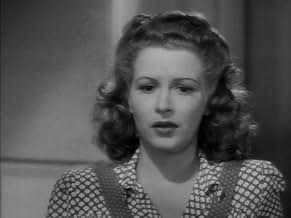Añade un argumento en tu idiomaEx-con Red O'Hara becomes a daring news photographer, but his old ways get him into trouble.Ex-con Red O'Hara becomes a daring news photographer, but his old ways get him into trouble.Ex-con Red O'Hara becomes a daring news photographer, but his old ways get him into trouble.
Jackie Gleason
- Screwball Evans
- (as Jackie C. Gleason)
Charles C. Wilson
- Reardon
- (as Charles Wilson)
Murray Alper
- Fingerprint Man's Assistant
- (sin acreditar)
Harry Arras
- Undetermined Role
- (sin acreditar)
Hobart Bosworth
- Chaplain
- (sin acreditar)
Bill Edwards
- Reporter
- (sin acreditar)
Jack Gardner
- Joe
- (sin acreditar)
Eddie Graham
- Reporter
- (sin acreditar)
Argumento
¿Sabías que...?
- CuriosidadesHarry Arras died of a heart attack on set while shooting a scene for this film.
- PifiasRed O'Hara addresses an envelope in close-up but the envelope he licks to seal is blank.
- ConexionesRemake of Ha entrado un fotógrafo (1933)
Reseña destacada
No need to recap the already-reviewed plot. The movie is a good example of an assembly line product that studios rushed into production for undemanding wartime audiences at a time when they were crowding theaters in record numbers. The film itself may be unmemorable, but the results still show slick professionalism of the studio system (here, Warner Bros.). It's also a chance for a newcomer like Travis to get needed exposure. He's Hollywood handsome, performs capably enough, but leaves no lasting impression and is a good example of an actor whose real medium turned out to be TV. Ditto comedian Jackie Gleason and William Hopper of old Perry Mason show in a bit part. In fact this is precisely the level of entertainment that would later transition to TV without missing a beat.
In passingwas there any cop during this period who wasn't Irish. My guess is that the stereotype was a safe and popular one because it raised no controversial connotations, unlike, say, a German or French cop. Also, both shootouts are rather conspicuously overdone. Note in the hotel room how the windowpane manages not to shatter despite fusillade after fusillade of police bullets. I suspect this was an effort to generate an appearance of more action in a crime drama that's otherwise somewhat short of the norm. Anyway, the 53 minutes remains a good example of routine bottom-of-the-bill entertainment, circa 1942.
In passingwas there any cop during this period who wasn't Irish. My guess is that the stereotype was a safe and popular one because it raised no controversial connotations, unlike, say, a German or French cop. Also, both shootouts are rather conspicuously overdone. Note in the hotel room how the windowpane manages not to shatter despite fusillade after fusillade of police bullets. I suspect this was an effort to generate an appearance of more action in a crime drama that's otherwise somewhat short of the norm. Anyway, the 53 minutes remains a good example of routine bottom-of-the-bill entertainment, circa 1942.
- dougdoepke
- 11 mar 2009
- Enlace permanente
Selecciones populares
Inicia sesión para calificar y añadir a tu lista para recibir recomendaciones personalizadas
Detalles
- Fecha de lanzamiento
- País de origen
- Idioma
- Títulos en diferentes países
- Huyendo de su pasado
- Localizaciones del rodaje
- Empresa productora
- Ver más compañías en los créditos en IMDbPro
- Duración51 minutos
- Color
- Relación de aspecto
- 1.37 : 1
Contribuir a esta página
Sugerir un cambio o añadir el contenido que falta

Principal laguna de datos
By what name was Escape from Crime (1942) officially released in India in English?
Responde



















